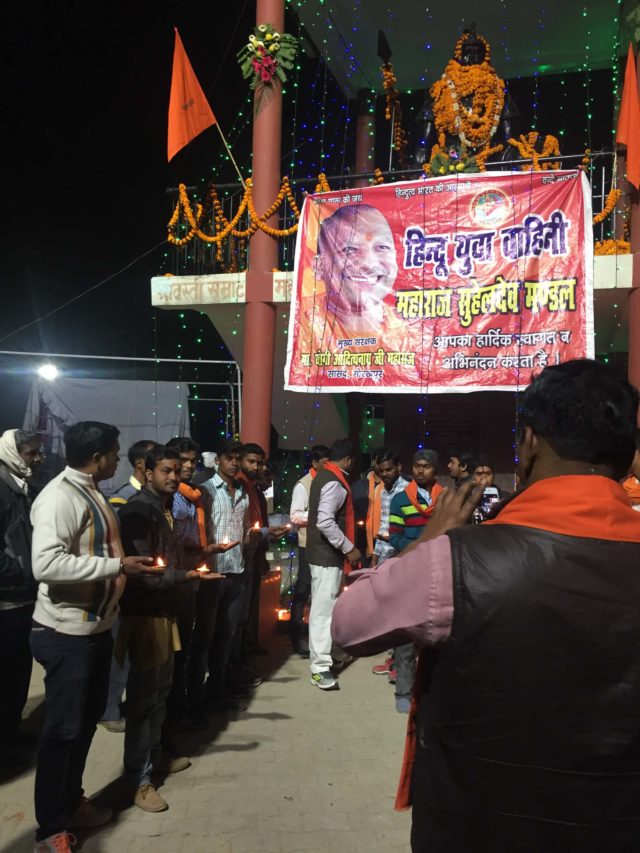By Abhimanyu Chandra
Picking up from the first part of this series (We Got An Eminent International Scholar Talking About Islamophobia, Hindu Nationalism & Elections’19), where I engaged on a wide-ranging, very interesting conversation with eminent Scholar Christophe Jaffrelot on Islamophobia, Hindu nationalism, and Elections 2019, this section talks about Hindu terror and allegations of Muslim appeasement.
Christophe Jaffrelot is a Senior Research Fellow at CERI-Sciences Po/CNRS, Paris, Professor of Indian Politics and Sociology at King’s India Institute, London, and Non-resident Scholar at the Carnegie Endowment for International Peace.

PART 2:
ON THE DEBATE OVER “HINDU TERROR” AND ALLEGATIONS OF “MUSLIM APPEASEMENT”
AC: To what extent is Hindu nationalism in India a reaction to kind of Jihad internationally? So, this is not to say justify Hindu nationalism but is Hindu nationalism – that goes without saying – but does Hindu nationalism become more understandable when we look at the global landscape which has a lot of…
CJ: … You may not need to look at the global landscape, but at the Indian situation to see that Hindu nationalism has always been a reaction to Islamic mobilizations. In the first place, the Khilafat Movement of 1919-21 prepared the ground for Hindutva, Who is a Hindu, Savarkar’s book in 1923 and for the making of RSS two years later. So this attitude is not new.
And in the more recent years the resurgence of Hindu nationalism can be explained also by terrorist attacks which started in the ’90s, but gained momentum in the 2000s, culminating in the 2008 Mumbai attack.
The point is that it depends where is the chicken and where is the egg because you can also say that some of these terrorist attacks were responses to Hindutva mobilization.
Mumbai ’93 was a reaction to the demolition of the Babri Masjid, and India Mujahideen a reaction to the Gujarat pogrom.
But of course, because they resorted to terrorism, they helped the Sangh Parivar to mount campaigns against Islamism and even Islam.
There is a dialectic. There is no doubt about that. But who is reacting to whom needs to be examined on a case by case study.

AC: Got it. Even as there is this reaction, counter-reaction, right now in the election season in India, there is a lot of talk by BJP leaders that a Hindu cannot be a terrorist.
This has become something of a campaign issue, and the BJP is trying to corner the Congress on this. Could you shed some light on this thinking, this assertion?
CJ: It is very important for the Hindu nationalists to project an identity that is non-violent and to claim that Hindus are victims – and victims of Muslims or Pakistan in particular. This threat makes their counter-mobilisation legitimate.
Now of course, we know that Hindus can resort to political violence. The first revolutionary movement under the Raj is a case in point. Anushilan Samiti in Calcutta was made of worshipers of Kali. They would take their oath with the Gita in one hand and the pistol in the other hand.
Tilak also legitimized political violence in the name of Hinduism, as evident from his reading of the Gita.
And never forget that Hedgewar who went to Calcutta to take part in the revolutionary movement, was influenced by Tilak and Moonje, one of Tilak’s lieutenants who started the Nasik Bhonsle Military School in the 1930s for training Hindus.
In the 1940s, Savarkar, instead of fighting the British in the Quit India Movement preferred to cooperate with them and invited the Hindus to join their army in order to “militarise Hindudom”.
One of his followers, Nathuram Godse created the Hindu Rashtra Dal and was probably the first terrorist of post independence India.
The last incarnation of this long tradition, Abhinav Bharat, whose training partly took place in the Nasik Bhonsle Military School incidentally, according to Hemant Karkare, was involved in four terrorist cases in the years 2007-2008. So it is difficult to say that Hindus cannot indulge in violence, something the LTTE has shown too.

Read More: ‘In Politics Choice Isn’t Between Good & Bad, But Bad & Worse’: Aam Aadmi Party’s Atishi Talks To ED
AC: The idea that you know for a Hindu nationalist it’s very important to portray Hindus as victims, I want to further [explore] that thought, with the question that, partly how Hindu nationalists say this is that there has been a lot of appeasement of minorities in India, specifically Muslims, and that’s come at the cost of Hindus, i.e., Hindus are victims.
Of course there is a lot of scholarship rebutting that assertion, very squarely. So if I had to kind of tilt that question on its head and ask, one, has there been appeasement of any specific group in post-independence India, and if so then which group or groups might that be?
CJ: When people say that there is a Muslim appeasement, they think in terms of vote-bank politics. In fact they think in terms of symbolic measures.
The Shah Bano affair is a case in point, when Rajiv Gandhi bowed to conservative ulema, and reformed the law to please them. That’s a symbolic appeasement measure.
If you look at non-symbolic appeasement, you will see first that Urdu has not been protected, and therefore Muslims have somewhat lost their language, a language that in north India is now read by only half of the Muslims. Urdu has become an official language in Uttar Pradesh in 1989 only. The Congress governments have not defended Urdu.
Secondly socio-economically, there are tons of data showing that Muslims are losing ground. They are not part of the salariat but mostly of the informal sector.
Third, they lag behind in terms of education, partly because of the Urdu problem that I’ve already mentioned.
For all these reasons, not only the Muslims of India have failed to replace the elite which left the country and went to Pakistan in 1947, but they are the only group which over seventy years has declined. Now their standard of living is below the Dalits, except in some pockets across the country. This is what the Indian Human Development Survey tells us.
If you look for the groups which have prospered the most, you will find those who have benefited the most from the 1991 economic liberalization and sections of those who enjoy reservations.
In these groups, the middle class is becoming stronger.
Stay connected to catch Part 3 of this series on hindu nationalism and the current elections.
This transcript has been edited and condensed for clarity.
Author Bio: The interviews are entirely conceptualised and conducted by Abhimanyu Chandra, who is a Ph.D. student at the University of Chicago.
Other Recommendations:
Indians React To The Controversial Time Magazine Cover Calling Modi “Divider In Chief”






























